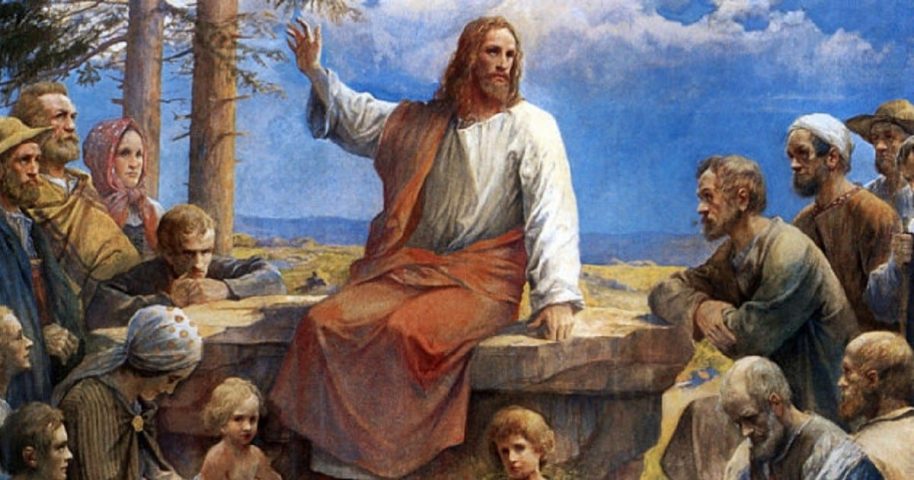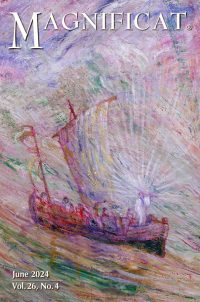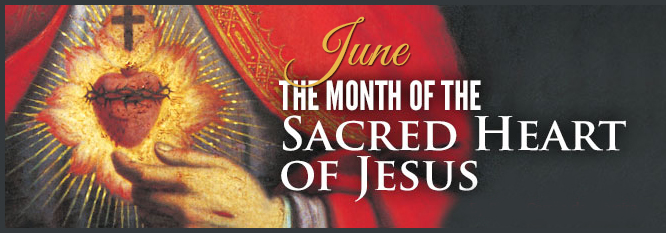
Catena Aurea by St. Thomas Aguinas
5:27–28
27. Ye have heard that it was said by them of old time, Thou shalt not commit adultery:
28. But I say unto you, That whosoever looketh on a woman to lust after her hath committed adultery with her already in his heart.
CHRYSOSTOM. (Hom. xvii.) The Lord having explained how much is contained in the first commandment, namely, Thou shalt not kill, proceeds in regular order to the second.
AUGUSTINE. (Serm. ix. 3 and 10.) Thou shalt not commit adultery, that is, Thou shalt go no where but to thy lawful wife. For if you exact this of your wife, you ought to do the same, for the husband ought to go before the wife in virtue. It is a shame for the husband to say that this is impossible. Why not the husband as well as the wife? And let not him that is unmarried suppose that he does not break this commandment by fornication; you know the price wherewith you have been bought, you know what you eat and what you drinkg, therefore keep yourself from fornications. Forasmuch as all such acts of lust pollute and destroy God’s image, (which you are,) the Lord who knows what is good for you, gives you this precept that you may not pull down His temple which you have begun to be.
AUGUSTINE. (cont. Faust. xix. 23.) He then goes on to correct the error of the Pharisees, declaring, Whoso looketh upon a woman to lust after her, hath committed adultery already with her in his heart. For the commandment of the Law, Thou shall not lust after thy neighbour’s wife, (Exod. 20:17.) the Jews understood of taking her away, not of committing adultery with her.
JEROME. Between πάθος and προπάθεια, that is between actual passion and the first spontaneous movement of the mind, there is this difference: passion is at once a sin; the spontaneous movement of the mind, though it partakes of the evil of sin, is yet not held for an offence committedh. When then one looks upon a woman, and his mind is therewith smitten, there is propassion; if he yields to this he passes from propassion to passion, and then it is no longer the will but the opportunity to sin that is wanting. Whosoever, then, looketh on a woman to lust after her, that is, so looks on her as to lust, and cast about to obtain, he is rightly said to commit adultery with her in his heart.
AUGUSTINE. (Serm. in Mont. i. 12.) For there are three things which make up a sin; suggestion either through the memory, or the present sense; if the thought of the pleasure of indulgence follows, that is an unlawful thought, and to be restrained; if you consent then, the sin is complete. For prior to the first consent, the pleasure is either none or very slight, the consenting to which makes the sin. But if consent proceeds on into overt act, then desire seems to be satiated and quenched. And when suggestion is again repeated, the contemplated pleasure is greater, which previous to habit formed was but small, but now more difficult to overcome.
GREGORY. (Mor. xxi. 2.) But whoso casts his eyes about without caution will often be taken with the pleasure of sin, and ensnared by desires begins to wish for what he would not. Great is the strength of the flesh to draw us downwards, and the charm of beauty once admitted to the heart through the eye, is hardly banished by endeavour. We must therefore take heed at the first, we ought not to look upon what it is unlawful to desire. For that the heart may be kept pure in thought, the eyes, as being on the watch to hurry us to sin, should be averted from wanton looks.
CHRYSOSTOM. If you permit yourself to gaze often on fair countenances you will assuredly be taken, even though you may be able to command your mind twice or thrice. For you are not exalted above nature and the strength of humanity. She too who dresses and adorns herself for the purpose of attracting men’s eyes to her, though her endeavour should fail, yet shall she be punished hereafter; seeing she mixed the poison and offered the cup, though none was found who would drink thereof. For what the Lord seems to speak only to the man, is of equal application to the woman; inasmuch as when He speaks to the head, the warning is meant for the whole body.
5:29–30
29. And if thy right eye offend thee, pluck it out, and cast it from thee: for it is profitable for thee that one of thy members should perish, and not that thy whole body should be cast into hell.
30. And if thy right hand offend thee, cut it off, and cast it from thee: for it is profitable for thee that one of thy members should perish, and not that thy whole body should be cast into hell.
GLOSS. (non occ.) Because we ought not only to avoid actual sin, but even put away every occasion of sin, therefore having taught that adultery is to be avoided not in deed only, but in heart, He next teaches us to cut off the occasions of sin.
PSEUDO-CHRYSOSTOM. But if according to that of the Prophet, there is no whole part in our body, (Ps. 38:3.) it is needful that we cut off every limb that we have that the punishment may be equal to the depravity of the flesh. Is it then possible to understand this of the bodily eye or hand? As the whole man when he is turned to God is dead to sin, so likewise the eye when it has ceased to look evil is cut off from sin. But this explanation will not suit the whole; for when He says, thy right eye offends thee, what does the left eye? Does it contradict the right eye, and it is preserved innocent?
JEROME. Therefore by the right eye and the right hand we must understand the love of brethren, husbands and wives, parents and kinsfolk; which if we find to hinder our view of the true light, we ought to sever from us.
AUGUSTINE. (Serm. in Mont. i. 13.) As the eye denotes contemplation, so the hand aptly denotes action. By the eye we must understand our most cherished friend, as they are wont to say who would express ardent affection, ‘I love him as my own eye.’ And a friend too who gives counsel, as the eye shews us our way. The right eye, perhaps, only means to express a higher degree of affection, for it is the one which men most fear to lose. Or, by the right eye may be understood one who counsels us in heavenly matters, and by the left one who counsels in earthly matters. And this will be the sense; Whatever that is which you love as you would your own right eye, if it offend you, that is, if it be an hindrance to your true happiness, cut it off and cast it from you. For if the right eye was not to be spared, it was superfluous to speak of the left. The right hand also is to be taken of a beloved assistant in divine actions, the left hand in earthly actions.
PSEUDO-CHRYSOSTOM. Otherwise; Christ would have us careful not only of our own sin, but likewise that even they who pertain to us should keep themselves from evil. Have you any friend who looks to your matters as your own eye, or manages them as your own hand, if you know of any scandalous or base action that he has done, cast him from you, he is an offence; for we shall give account not only of our own sins, but also of such of those of our neighbours as it is in our power to hinder.
HILARY. Thus a more lofty step of innocence is appointed us, in that we are admonished to keep free, not only from sin ourselves, but from such as might touch as from without.
JEROME. Otherwise; As above He had placed lust in the looking on a woman, so now the thought and sense straying hither and thither He calls ‘the eye.’ By the right hand and the other parts of the body, He means the initial movements of desire and affection.
PSEUDO-CHRYSOSTOM. The eye of flesh is the mirror of the inward eye. The body also has its own sense, that is, the left eye, and its own appetite, that is, the left hand. But the parts of the soul are called right, for the soul was created both with free-will and under the law of righteousness, that it might both see and do rightly. But the members of the body being not with free-will, but under the law of sin, are called the left. Yet He does not bid us cut off the sense or appetite of the flesh; we may retain the desires of the flesh, and yet not do thereafter, but we cannot cut off the having the desires. But when we wilfully purpose and think of evil, then our right desires and right will offend us, and therefore He bids us cut them off. And these we can cut off, because our will is free. Or otherwise; Every thing, however good in itself that offends ourselves or others, we ought to cut off from us. For example, to visit a woman with religious purposes, this good intent towards her may be called a right eye, but if often visiting her I have fallen into the net of desire, or if any looking on are offended, then the right eye, that is, something in itself good, offends me. For the right eye is good intention, the right hand is good desire.
GLOSS. (ord.) Or; the right eye is the contemplative life which offends by being the cause of indolence or self-conceit, or in our weakness that we are not able to support it unmixed. The right hand is good works, or the active life, which offends us when we are ensnared by society and the business of life. If then any one is unable to sustain the contemplative life, let him not slothfully rest from all action; or on the other hand while he is taken up with action, dry up the fountain of sweet contemplation.
REMIGIUS. The reason why the right eye and the right hand are to be cast away is subjoined in that, For it is better, &c.
PSEUDO-CHRYSOSTOM. For as we are every one members one of another, it is better that we should be saved without some one of these members, than that we perish together with them. Or, it is better that we should be saved without one good purpose, or one good work, than that while we seek to perform all good works we perish together with all.
5:31–32
31. It hath been said, Whosoever shall put away his wife, let him give her a writing of divorcement:
32. But I say unto you, That whosoever shall put away his wife, saving for the cause of fornication, causeth her to commit adultery: and whosoever shall marry her that is divorced committeth adultery.
GLOSS. (non occ.) The Lord had taught us above that our neighbour’s wife was not to be coveted, He now proceeds to teach that our own wife is not to be put away.
JEROME. For touching Moses’s allowance of divorce, the Lord and Saviour more fully explains in conclusion, that it was because of the hardness of the hearts of the husbands, not so much sanctioning discord, as checking bloodshed.
PSEUDO-CHRYSOSTOM. For when Moses brought the children of Israel out of Egypt, they were indeed Hebrews in race, but Egyptians in manners. And it was caused by the Gentile manners that the husband hated the wife; and if he was not permitted to put her away, he was ready either to kill her or ill-treat her. Moses therefore suffered the bill of divorcement, not because it was a good practice in itself, but was the prevention of a worse evil.
HILARY. But the Lord who brought peace and goodwill on earth, would have it reign especially in the matrimonial bond.
AUGUSTINE. (cont. Fasust. xix. 26.) The Lord’s command here that a wife is not to be put away, is not contrary to the command in the Law, as Manichæus affirmed. Had the Law allowed any who would to put away his wife, to allow none to put away were indeed the very opposite of that. But the difficulty which Moses is careful to put in the way, shews that he was no good friend to the practice at all. For he required a bill of divorcement, the delay and difficulty of drawing out which would often cool headlong rage and disagreement, especially as by the Hebrew custom, it was the Scribes alone who were permitted to use the Hebrew letters, in which they professed a singular skill. To these then the law would send him whom it bid to give a writing of divorcement, when he would put away his wife, who mediating between him and his wife, might set them at one again, unless in minds too wayward to be moved by counsels of peace. Thus then He neither completed, by adding words to it, the law of them of old time, nor did He destroy the Law given by Moses by enacting things contrary to it, as Manichæus affirmed; but rather repeated and approved all that the Hebrew Law contained, so that whatever He spoke in His own person more than it had, had in view either explanation, which in divers obscure places of the Law was greatly needed, or the more punctual observance of its enactments.
AUGUSTINE. (Serm. in Mont. i. 14.) By interposing this delay in the mode of putting away, the lawgiver shewed as clearly as it could be shewn to hard hearts, that he hated strife and disagreement. The Lord then so confirms this backwardness in the Law, as to except only one case, the cause of fornication; every other inconvenience which may have place, He bids us bear with patience in consideration of the plighted troth of wedlock.
PSEUDO-CHRYSOSTOM. If we ought to bear the burdens of strangers, in obedience to that of the Apostle, Bear ye one another’s burdens, (Gal. 6:2.) how much more that of our wives and husbands? The Christian husband ought not only to keep himself from any defilement, but to be careful not to give others occasion of defilement; for so is their sin imputed to him who gave the occasion. Whoso then by putting away his wife gives another man occasion of committing adultery, is condemned for that crime himself.
AUGUSTINE. (ubi sup.) Yea more, He declares the man who marries her who is put away an adulterer.
CHRYSOSTOM. Say not here, It is enough her husband has put her away; for even after she is put away she continues the wife of him that put her away.
AUGUSTINE. (ubi sup.) The Apostle has fixed the limit here, requiring her to abstain from a fresh marriage as long as her husband lives. After his death he allows her to marry. But if the woman may not marry while her former husband is alive, much less may she yield herself to unlawful indulgences. But this command of the Lord, forbidding to put away a wife, is not broken by him who lives with her not carnally but spiritually, in that more blessed wedlock of those that keep themselves chaste. A question also here arises as to what is that fornication which the Lord allows as a cause of divorce; whether carnal sin, or, according to the Scripture use of the word, any unlawful passion, as idolatry, avarice, in short all transgression of the Law by forbidden desires. For if the Apostle permits the divorce of a wife if she be unbelieving, (though indeed it is better not to put her away,) and the Lord forbids any divorce but for the cause of fornication, unbelief even must be fornication. And if unbelief be fornication, and idolatry unbelief, and covetousness idolatry, it is not to be doubted that covetousness is fornication. And if covetousness be fornication, who may say of any kind of unlawful desire that it is not a kind of fornication?
AUGUSTINE. (Retract. i. 19. 6.) Yet I would not have the reader think this disputation of ours sufficient in a matter so arduous; for not every sin is spiritual fornication, nor does God destroy every sinner, for He hears His saints daily crying to Him, Forgive us our debts; but every man who goes a whoring and forsakes Him, him He destroys. Whether this be the fornication for which divorce is allowed is a most knotty question—for it is no question at all that it is allowed for the fornication by earnal sin.
AUGUSTINE. (lib. 83. Quæst. q. ult.) If any affirm that the only fornication for which the Lord allows divorce is that of earnal sin, he may say that the Lord has spoken of believing husbands and wives, forbidding either to leave the other except for fornication.
AUGUSTINE. (Serm. in Mont. i. 16.) Not only does He permit to put away a wife who commits fornication, but whoso puts away a wife by whom he is driven to commit fornication, puts her away for the cause of fornication, both for his own sake and hers.
AUGUSTINE. (de Fid. et Op. 16.) He also rightly puts away his wife to whom she shall say, I will not be your wife unless you get me money by robbery; or should require any other crime to be done by him. If the husband here be truly penitent, he will cut off the limb that offends him.
AUGUSTINE. (Serm. in Mont. i. 16.) Nothing can be more unjust than to put away a wife for fornication, and yourself to be guilty of that sin, for then is that happened, Wherein thou judgest another, thou condemnest thyself. (Rom. 2:1.) When He says, And he who marrieth her who is put away, committeth adultery, a question arises, does the woman also in this case commit adultery? For the Apostle directs either that she remain unmarried, or be reconciled to her husband. There is this difference in the separation, namely, which of them was the cause of it. If the wife put away the husband and marry another, she appears to have left her first husband with the desire of change, which is an adulterous thought. But if she have been put away by her husband, yet he who marries her commits adultery, how can she be quit of the same guilt? And further, if he who marries her commits adultery, she is the cause of his committing adultery, which is what the Lord is here forbidding.
Catena Aurea Matthew 5
Gospel Reading: From: Matthew 5:27-32
Jesus and His Teaching, the Fulfillment of the Law (Continuation)
-----------------------------------------------------------------
(Jesus said to His disciples:) [27] "You have heard that it was said, `You shall not commit adultery.' [28] But I say to you that every one who looks at a woman lustfully has already committed adultery with her in his heart. [29] If your right eye causes you to sin, pluck it out and throw it away; it is better that you lose one of your members than that your whole body be thrown into hell. [30] And if your right hand causes you to sin, cut it off and throw it away; it is better that you lose one of your members than that your whole body go into hell.
[31] "It was also said, `Whoever divorces his wife, let him give her a certificate of divorce.' [32] But I say to you that every one who divorces his wife, except on the ground of unchastity, makes her an adulteress; and whoever marries a divorced woman commits adultery."
***********************************************************************
Commentary:
27-30. This refers to a sinful glance at any woman, be she married or not. Our Lord fills out the precepts of the Old Law, where only adultery and the coveting of one's neighbor's wife were considered sinful.
"Lustfully": feeling is one thing, consenting another. Consent presupposes that one realizes the evil of these actions (looking, imagining, having impure thoughts) and freely engages in them.
Prohibition of vices always implies a positive aspect--the contrary virtue. Holy purity, like every other virtue, is something eminently positive; it derives from the First Commandment and is also directed to it: "You shall love the Lord your God WITH ALL your heart, WITH ALL your soul, and WITH ALL your mind" (Matthew 22:37). "Purity is a consequence of the love that prompts us to commit to Christ our soul and body, our faculties and senses. It is not something negative; it is a joyful affirmation" (St J. Escriva, "Christ Is Passing By", 5). This virtue demands that we use all the resources available to us, to the point of heroism if necessary.
"Right eye", "right hand", refers to whatever we value most. Our Lord lays it on the line and it not exaggerating. He obviously does not mean that we should physically mutilate ourselves, but that we should fight hard without making any concessions, being ready to sacrifice anything which clearly could put us in the way of offending God. Jesus' graphic words particularly warn us about one of the most common occasions of sin, reminding us of how careful we need to be guarding our sight. King David, by indulging his curiosity, went on to commit adultery and crime. He later wept over his sins and led a holy life in the presence of God (cf. 2 Samuel 11 and 12).
"The eyes! Through them many iniquities enter the soul. So many experiences like David's!--If you guard your sight you will have assured the guard of your heart: (St J. Escriva, "The Way", 183).
Among the ascetical methods of protecting the virtue of holy purity are: frequent Confession and Communion; devotion to our Lady; a spirit of prayer and mortification; guarding of the senses; flight from occasions of sin; and striving to avoid idleness by always being engaged in doing useful things. There are two further means which are particularly relevant today: "Decorum and modesty are younger brothers of purity" (St J. Escriva, "The Way", 128). Decorum and modesty are a sign of good taste, of respect for others and of human and Christian dignity. To act in accord with this teaching of our Lord, the Christian has to row against the current in a paganized environment and bring his influence for good to bear on it.
"There is need for a crusade of manliness and purity to counteract and undo the savage work of those who think that man is a beast. And that crusade is a matter for you" (St J. Escriva, "The Way", 121).
31-32. The Law of Moses (Deuteronomy 24:1), which was laid down in ancient times, had tolerated divorce due to the hardness of heart of the early Hebrews. But it had not specified clearly the grounds on which divorce might be obtained. The rabbis worked out different sorts of interpretations, depending on which school they belonged to--solutions ranging from very lax to quite rigid. In all cases, only husband could repudiate wife, not vice-versa. A woman's inferior position was eased somewhat by the device of a written document whereby the husband freed the repudiated woman to marry again if she wished. Against these rabbinical interpretations, Jesus re-establishes the original indissolubility of marriage as God instituted it (Genesis 1:27; 2:24; cf. Matthew 19:4-6; Ephesians 1:31; 1 Corinthians 7:10).
[The RSVCE carries a note which reads: "unchastity": The Greek word used here appears to refer to marriages which were not legally marriages, because they were within the forbidden degrees of consanguinity (Leviticus 18:6-16) or contracted with a Gentile. The phrase "except on the ground of unchastity" does not occur in the parallel passage in Luke 16:18. See also Matthew 19:9 (Mark 10:11-12), and especially 1 Corinthians 7:10-11, which shows that the prohibition is unconditional.] The phrase, "except on the ground of unchastity", should not be taken as indicating an exception to the principle of absolute indissolubility of marriage which Jesus has just re-established. It is almost certain that the phrase refers to unions accepted as marriage among some pagan people, but prohibited as incestuous in the Mosaic Law (cf. Leviticus 18) and in rabbinical tradition. The reference, then, is to unions radically invalid because of some impediment. When persons in this position were converted to the True Faith, it was not that their union could be dissolved; it was declared that they had never in fact been joined in true marriage. Therefore, this phrase does not do against the indissolubility of marriage, but rather reaffirms it.
On the basis of Jesus' teaching and guided by the Holy Spirit, the Church has ruled that in the specially grave case of adultery it is permissible for a married couple to separate, but without the marriage bond being dissolved; therefore, neither party may contract a new marriage.
The indissolubility of marriage was unhesitatingly taught by the Church from the very beginning; she demanded practical and legal recognition of this doctrine, expounded with full authority by Jesus (Matthew 19:3-9; Mark 10:1-12; Luke 16:18) and by the Apostles (1 Corinthians 6:16; 7:10-11; 39; Romans 7:2-3; Ephesians 5:31f). Here, for example, are just a few texts from the Magisterium on this subject:
"Three blessings are ascribed to matrimony [...]. The third is the indissolubility of matrimony--indissoluble because it signifies the indivisible union of Christ with the Church. Although a separation from bed may be permitted by reason of marital infidelity, nevertheless it is not permitted to contract another matrimony since the bond of a marriage lawfully contracted is perpetual" (Council of Florence, "Pro Armeniis").
"If anyone says that the bond of matrimony can be dissolved on account of heresy, or irksome cohabitation, or by reason of the voluntary absence of one of the parties, let him be anathema." (Council of Trent, “On Matrimony,” Can. 5, 1547)
"If anyone says that the Church errs in that she taught and teaches that in accordance with evangelical and apostolic doctrine the bond of matrimony cannot be dissolved by reason of adultery on the part of one of the parties, and that both, or even the innocent party who gave no occasion for adultery, cannot contract another marriage during the lifetime of the other, and that he is guilty of adultery who, having put away the adulteress, shall marry another, and she also who, having put away the adulterer, shall marry another, let him be anathema." (Council of Trent, “On Matrimony,” Can. 7)
"And to begin with that same Encyclical, which is wholly concerned in vindicating the divine institution of matrimony, its sacramental dignity, and its perpetual stability, let it be repeated as an immutable and inviolable fundamental doctrine that matrimony was not instituted or restored by man but by God; not by man were the laws made to strengthen and confirm and elevate it but by God, the Author of nature, and by Christ Our Lord by Whom nature was redeemed, and hence these laws cannot be subject to any human decrees or to any contrary pact even of the spouses themselves. This is the doctrine of Holy Scripture; this is the constant tradition of the Universal Church; this the solemn definition of the sacred Council of Trent, which declares and establishes from the words of Holy Writ itself that God is the Author of the perpetual stability of the marriage bond, its unity and its firmness, although before Christ the sublimeness and the severity of the primeval law was so tempered that Moses permitted to the chosen people of God on account of the hardness of their hearts that a bill of divorce might be given in certain circumstances, nevertheless, Christ, by virtue of His supreme legislative power, recalled this concession of greater liberty and restored the primeval law in its integrity by those words which must never be forgotten, "What God hath joined together let no man put asunder." " (Pius XI. “Casti connubii”)
“For the good of the spouses and their off-springs as well as of society, the existence of the sacred bond no longer depends on human decisions alone. For, God Himself is the author of matrimony...intimate union [of marriage] and the good of the children impose total fidelity on the spouses and argue for an unbreakable oneness between them." (“Vatican II, Gaudium et spes,” 48)




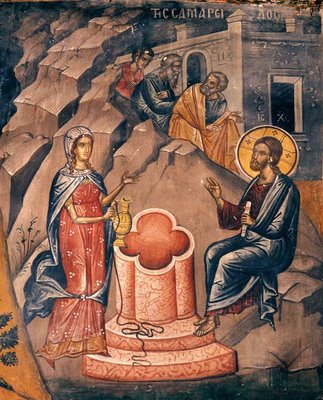
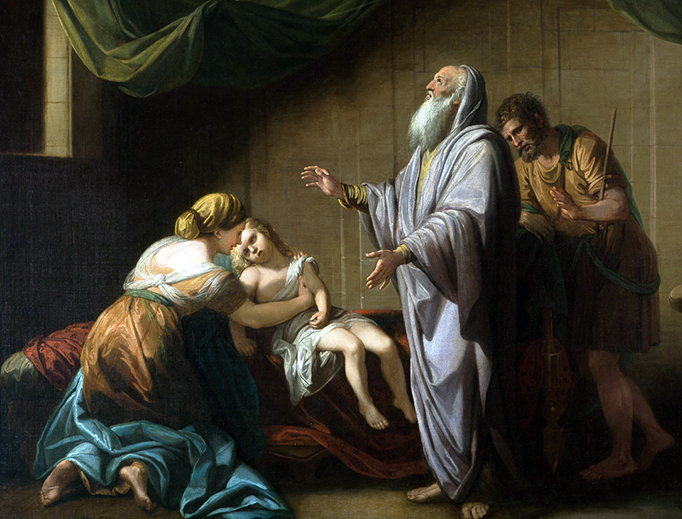 Benjamin West, “Elisha Raising the Shunammite’s Son,” 1766 (photo: Public Domain)
Benjamin West, “Elisha Raising the Shunammite’s Son,” 1766 (photo: Public Domain) 

